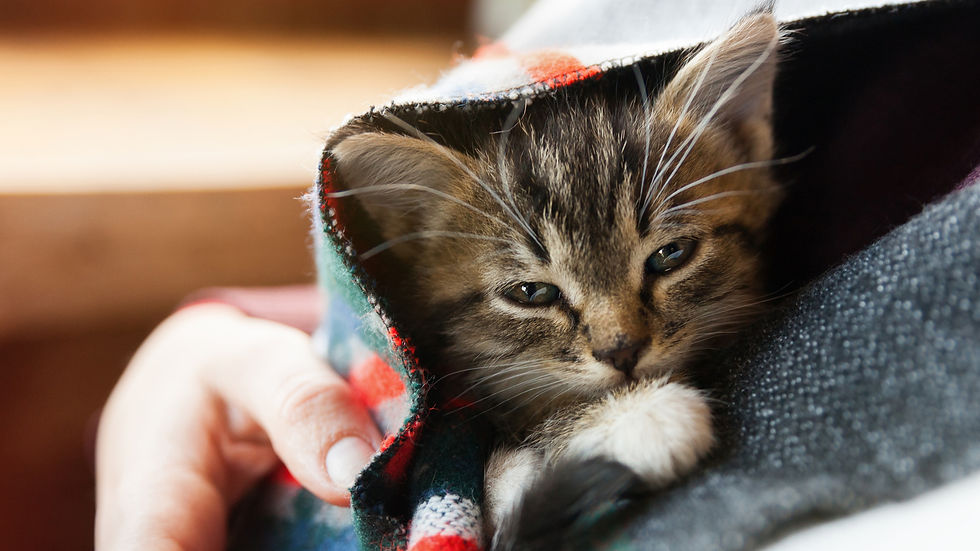Adolescent cats (12-24 weeks old) are in a transitional period where they’re growing rapidly and adapting to their new home. Along with routine care, it’s helpful to know about common health concerns for adolescent cats.. Here are a few that every kitten owner should keep on their radar:

Intestinal Parasites
Parasites like roundworms, hookworms, and tapeworms are frequently seen in kittens.
- How They’re Acquired: Kittens may get these parasites from their mother’s milk (Toxocara cati), contact with contaminated soil (Toxascaris leonina), or ingesting fleas (Dipylidium tapeworms).
- Symptoms: You might notice bloating, diarrhea, weight loss despite a healthy appetite, or visible worms in their stool.
- Prevention & Treatment: Routine deworming is important this age group. During your kittens routine health checks we will suggest safe medications to rid your kitten of parasites. Also, using flea prevention products can reduce the risk of tapeworms.

Upper Respiratory Infections (URIs)
URIs are very common in young cats, especially those who’ve been in shelters or breeding catteries.
- Causes: They’re typically caused by viruses like feline herpesvirus (FHV) or feline calicivirus, often accompanied by secondary bacterial infections.
- Symptoms: Sneezing, watery or thick discharge from the eyes and nose, congestion, fever, and reduced appetite are telltale signs.
- Care: While mild cases may improve with supportive care like hydration and appetite stimulation, more severe cases may require antibiotics or antiviral medications. Vaccinations against these viruses help reduce severity and spread.

Feline Ear Mites
Ear mites (Otodectes cynotis) are tiny parasites that can live in your kitten’s ear canal, causing irritation.
- Symptoms: Head shaking, ear scratching, and dark, crumbly debris that looks like coffee grounds in the ears.
- Treatment: We can confirm an ear mite infestation during a health check and prescribe medicated drops or topical treatments to eliminate the mites. Keeping your kitten’s environment clean can also reduce the risk.

Gastrointestinal Upsets
Kittens are naturally curious and may eat things they shouldn’t, leading to upset stomachs.
- Symptoms: Vomiting, diarrhea, or both. Depending on the cause, symptoms may resolve quickly or indicate a more serious issue like a foreign body ingestion.
- When to Worry: Persistent vomiting or signs of pain (like crying or a hunched posture) warrant a vet exam.

Dental Issues and Teething
By this stage, kittens are teething as their baby teeth are replaced with adult teeth.
- Symptoms: Mild gum irritation, and sometimes bad breath.
- Care Tips: Offer safe chew toys to satisfy their urge to gnaw and ease discomfort. If you notice excessive drooling or difficulty eating, a vet check may be needed to rule out dental abnormalities.

Conjunctivitis (Pink Eye)
Kittens are prone to eye infections, especially if they’ve been exposed to the feline chlamydia bacterium or feline herpesvirus.
- Symptoms: Red, swollen eyes with clear or cloudy discharge.
- Treatment: We can prescribe antibiotics or antivirals to clear up the infection. Severe cases may warrant referral to an eye specialist (ophthalmologist).

Ringworm
Despite its name, ringworm is a fungal infection that affects the skin, fur, and nails.
- Symptoms: Circular patches of hair loss, scaly or crusty skin, and sometimes itchiness.
- Contagion: This condition is highly contagious, both to other pets and humans.
- Treatment: Topical antifungal creams, medicated baths, and oral antifungal medications may be prescribed. Cleaning your home thoroughly can help prevent spread.

Health Concerns for Adolescent Cats - Conculsion
Even minor symptoms in kittens can escalate quickly due to their small size and developing immune systems. If your kitten shows signs of illness like a lack of appetite, lethargy, vomiting, or diarrhoea that lasts more than a day, it’s best to give us a call right away. Early intervention can make all the difference in your kitten’s health and happiness.
